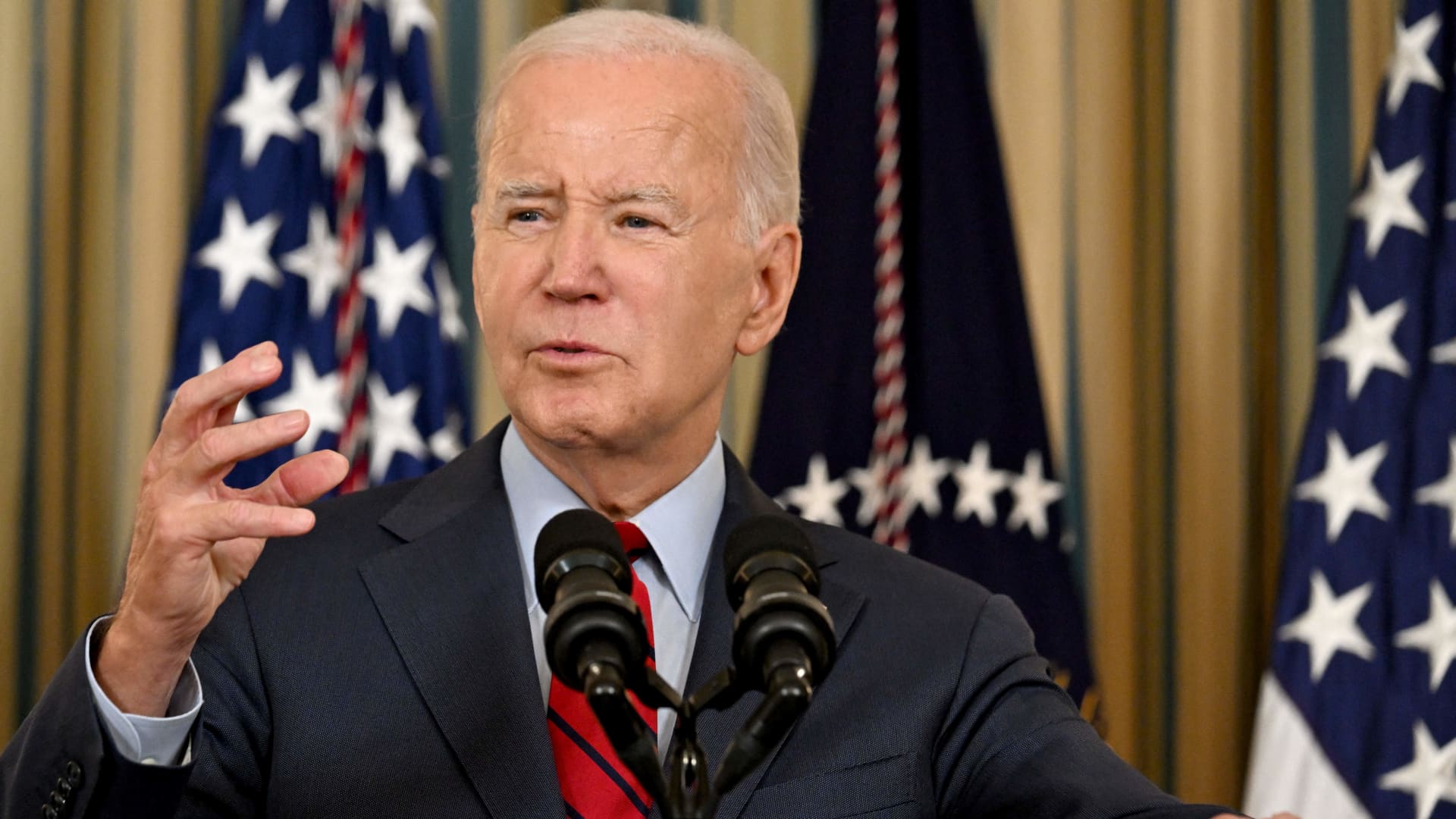US President Joe Biden speaks about strengthening US ports and supply chains after the International Longshore and Warehouse Union and the Pacific Maritime Association finalized a new contract covering west coast ports, in the State Dining Room of the White House in Washington, DC, on September 6, 2023.
Jim Watson | Afp | Getty Images
President Joe Biden is flaunting his investments in Black- and Latino-owned small businesses as the Latino vote slips from his grasp heading into the 2024 election year.
The president on Wednesday highlighted the parts of his Investing in America agenda aimed at supporting small businesses at Wisconsin’s Black Chamber of Commerce in Milwaukee. His remarks specifically focused on the success of “Bidenomics” for minority-owned small businesses, especially in contrast to the policies of former President Donald Trump.
“My predecessor, on his watch, women and minority-owned small businesses found themselves last in line to access emergency relief,” Biden said Wednesday.
“On my watch, energy and emergency relief went to minority-owned businesses first, not last.”
The Department of the Treasury estimates that Biden’s investments in community lenders will lead to a $50 billion increase in lending to Latino communities and a $80 billion rise for Black communities. A White House official noted before Wednesday’s event that Black small business ownership is growing faster than it has in 30 years and the creation rate of Latino small businesses is at a decade high.
Biden’s push to spotlight his support for economic equity comes amid dismal polling that shows him losing ground with Latino voters, a key demographic that helped put him in the White House in 2020.
A recent CNBC survey found that Republican front-runner Donald Trump has a 5-point lead against Biden among Latinos. Biden did maintain a significant lead against Trump with Black voters, 75% of whom said they would support the current president in a hypothetical matchup.
Biden’s effort to underscore his dedication to minority-owned small business investment is the latest bid to gain some of that ground back.
It is a strategy that has helped him before. In 2020, Biden campaigned on the idea that closing the racial economic equity gap would help heal the pandemic-stricken economy.
As such, Biden made minority-owned business investment a central pillar of his “Build Back Better” economic platform. He pledged to create a fund with $30 billion of seed money for small businesses and to “advance racial equity.”
This rhetoric came against the backdrop of a broader reckoning over racism in policing that sparked protests nationwide. Biden’s focus on correcting racial inequity also served as a contrast to his Republican opponent, Trump.
“Every instinct Trump has is to add fuel to the fire,” Biden said at the time.
On Wednesday, Biden again differentiated his diversity stance from Trump.
“Diversity is our strength as a nation,” Biden said. “I don’t believe, as our former president said again yesterday, that immigrants are polluting our blood.”
The president was referring to Trump’s recent claim that immigrants are “poisoning the blood” of America, which the Biden campaign said “parroted Hitler.”
Biden has made headway on some of the campaign promises from 2020 and he wants voters to know it.
Earlier in 2023, Biden launched the Recompete program, which will choose 24 small businesses from economically distressed areas to receive grants of between $20 million to $50 million and 24 other recipients for grants between $250,000 and $500,000.
These grants would provide a meaningful boost to small business owners of color who face well-documented obstacles in securing capital investments and loans.
But these wins come after a year of economic woes that have exacerbated the headwinds facing minority small business owners.
A White House official noted that beyond the more deep-rooted hurdles that Black and Latino business owners face, this year has also brought “inflationary pressures.”
There are many causes for the record-high inflation that has squeezed budgets: supply chain disruptions causing product shortages, interest rate volatility boosting producer costs and pent-up demand lingering from the pandemic. Biden has pointed the finger at corporate price-gouging to explain why some consumer prices have not come down even as the economy appears to be recovering.
But so far, voters still blame the president.
The December CNBC All-America Economic Survey found that Biden’s approval ratings have fallen to an all-time low, driven in part by his handling of the economy.
For Latino voters specifically, polling has shown that the rising cost of living and jobs are top of mind heading into ballot season, which could explain why they are fleeing Biden’s camp.
Correction: Biden will address Wisconsin’s Black Chamber of Commerce in Milwaukee on Wednesday. An earlier version misstated the day.

